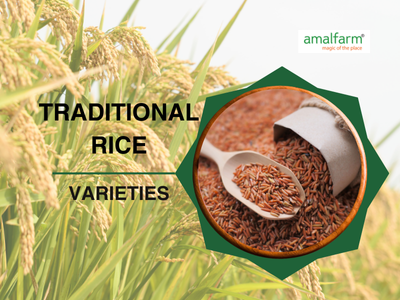
Traditional Rice Varieties in Indian Festivals and Rituals
amalfarm2024-07-20T09:51:44+00:00Traditional rice Varieties hold a special place in Indian culture. It is more than just a staple food; it symbolizes prosperity, fertility, and life. Rice is integral to many festivals and rituals throughout India’s diverse regions. It doesn’t fail to reflect its deep-rooted significance in the country’s traditions.
Amalfarm is here to tell you, in this detailed blog, the tale of such traditional rice varieties and their significance in Indian festivals and rituals.
Traditional Rice Varieties in Hindu Festivals
Pongal: The Harvest Festival
Pongal, celebrated mainly in Tamil Nadu, marks the end of the winter solstice and the beginning of the sun’s journey northward. The festival is named after the traditional dish prepared from newly harvested rice, symbolizing abundance and prosperity. Families gather to cook this dish, offer it to the sun god, and then share it with friends and neighbors. The preparation of Pongal involves cooking newly harvested traditional rice varieties with milk and jaggery, creating a dish that signifies the sweetness and abundance of the harvest. The reverence for these rice varieties during Pongal underscores their cultural and agricultural importance.

Makar Sankranti: Welcoming the New Harvest
Makar Sankranti, observed across India, celebrates the new harvest season. It signifies the sun’s transition into Capricorn. On this day, people prepare various dishes from freshly harvested rice. In Maharashtra, tilgul (a sweet made from sesame seeds and jaggery) and rice play a significant role. In Karnataka, Ellu Bella, a mix of sesame seeds, jaggery, and rice, is distributed among friends and family. Traditional rice varieties are used to prepare these special dishes, highlighting their role in the celebration of Makar Sankranti. The use of rice in these festivities not only enhances the flavor of the dishes but also connects people with their agrarian roots.

Significance of Traditional Rice Varieties in Weddings and Rituals
Symbol of Fertility and Prosperity
In Indian weddings, rice is a vital component. During the ceremony, rice is sprinkled on the couple as a blessing for a prosperous and fertile marriage. The act of throwing rice signifies the couple’s future filled with wealth, happiness, and good fortune. Traditional rice varieties are often chosen for this ritual, symbolizing purity and abundance.
Rice in Pujas and Rituals
Rice is also used in various pujas (prayer rituals). During these rituals, rice mixed with turmeric is offered to deities, symbolizing devotion and reverence. The presence of rice in these rituals underscores its importance as a life-sustaining grain. The use of rice in religious ceremonies highlights its role in maintaining cultural heritage and spiritual practices.
Regional Variations in Rice Rituals
West Bengal: Durga Puja and Rice
In West Bengal, Durga Puja is the most significant festival, and rice plays a crucial role. Bhog, the food offered to the goddess Durga, often includes dishes made from rice, such as khichuri and rice pudding. These offerings are later distributed as prasad to the devotees. Traditional rice varieties like Gobindobhog are particularly valued for their unique aroma and taste, making them ideal for these sacred offerings. The use of traditional rice in Durga Puja emphasizes its cultural importance and the rich culinary heritage of West Bengal.

Kerala: Onam and Rice Delicacies
Onam, the harvest festival of Kerala, features a grand feast called Onam Sadya. This feast includes a variety of rice-based dishes, highlighting the region’s rich culinary traditions. From lemon rice to sweet rice payasam, these dishes celebrate the bounty of the harvest. Traditional rice varieties are integral to the Onam Sadya, adding to the authenticity and flavor of the feast. The celebration of Onam showcases the diverse culinary practices and the deep connection to agricultural traditions in Kerala.

Conclusion
In India, rice is deeply embedded in the cultural fabric. Its presence in festivals and rituals underscores its significance beyond nourishment. As a symbol of prosperity, fertility, and life, rice continues to play a vital role in the celebrations and traditions of India, connecting the past with the present and the future.
Traditional rice varieties hold a special place in these cultural practices, reflecting the richness of India’s agricultural heritage. The continued use and reverence for traditional rice varieties in festivals, weddings, and rituals highlight their enduring importance and the connection between the land, the farmers, and the people. By preserving and celebrating various rice varieties, we honor the legacy of our ancestors and ensure the sustainability of these invaluable grains for future generations.
At Amalfarm, we proudly provide a few revered varieties like these that will surely make your every meal better. Do not forget to click here and check them out!
